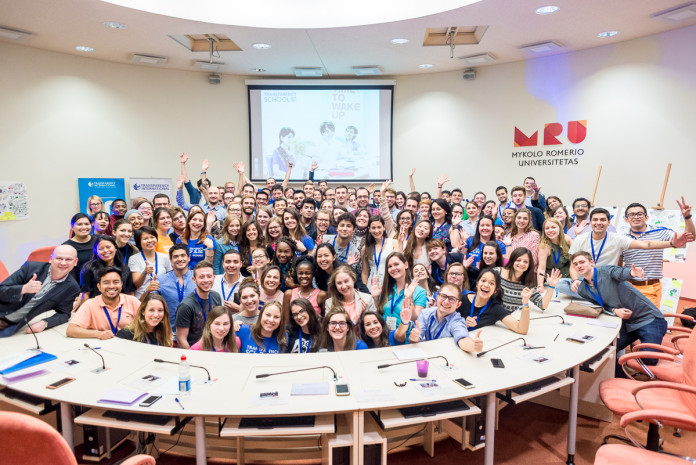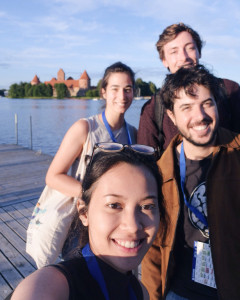
Editor’s Note: You’ve landed that job you have always wanted, or perhaps one which serves as a stepping stone towards that penultimate dream job you have always aspired to have. Or perhaps, you are stuck in a job that you dread yet pays the bills. Regardless of your job situation, there is always room for improvement. Whatever the job, you can always do more, get more, and be more – and one of the ways for you to take your career to the next level is by taking a (series of) short course(s) abroad. Haryani Dannisa works for a political risk consultancy firm in Jakarta, and here is her story of realizing the unthinkable: pursuing short courses in the Netherlands and Lithuania during a two week leave of absence, and being rewarded with an experience of a lifetime.

Two months ago, I requested a two week leave of absence from my office,
applied for a visa and went to Europe to have two short courses in one go. Looking back now, I think it was the most impulsive move I’ve ever made – but the most rewarding one too, seeing how the experience equipped me with more clarity about which path should I take next to be what I aspire to be.
I spent my first week at the University of Groningen in the Netherlands, where I joined a summer school on Illicit Trade. Quite surprisingly, out of 24 students, one third were practitioners like me who took a break from work to join the class. The same happened the next week when I went to Vilnius, Lithuania to join Transparency International School on Integrity, an annual one-week anti-corruption training that was organized by Transparency International. Half of its 100 something participants, who came from more than 50 countries, were young practitioners.

So what is it with short courses (or could also be known as ‘summer schools’) that invited practitioners to leave work for awhile to join the programme?
First, short courses satisfy those who are looking for practical or academic trainings in a shorter time frame than what should be devoted for a Bachelor’s or Master’s programme. For example, I met a girl in the University of Groningen who joined the ‘gender and diversity’ class to learn how best she should handle instances of gender discrimination in her workplace. In her case, leaving work for a one year master’s programme in gender would be too much.
This also applies if the company or organization you work for specialises in a field where many disciplines are interrelated, and you would like to add a new knowledge on a specific discipline without having to make a one-year or two-year commitment.

Second, short courses offer the chance to extend your network—but in a more professional way. Both programmes I joined invited guest lecturers who were successful practitioners in their respective fields. Therefore, I had a chance to discuss my career and my plan to pursue a master’s degree not only to the professors but also to guest lecturers from NATO, Rabobank, Interpol, and many other international organisations in this field that I currently work in.

Third, you can gain insights into how different the nature of your work is when applied in different jurisdictions. From the two weeks in Groningen and Vilnius, I met dozens of people who have more or less the same job descriptions as me yet encounter different daily scenarios. For example, I could see the difference between how I go about my daily routines as a political risk researcher with how a fraud investigator from PwC India usually conducts his investigations for corporate clients, as well as how an asset tracing analyst in Spain normally does her work. Not only that, my conversations and interactions with them made me truly realise the value of working in a Southeast Asian context, because personally I find it to be more interesting compared to other geographical contexts.
Overall, I can conclude that the right short course(s) – the one(s) with a comprehensive course structure, excellent guest lecturers, and qualified professional participants – are like quick-wins. They give you so many benefits in such a short span of time.

Considering the breadth of benefits, I think it is understandable why the practice of taking a short break from work to study short courses abroad is becoming more and more common in Europe or in the US. Having said that, it is not yet common in Indonesia. I myself strongly felt the need to take short courses after I made a decision to shift my career path earlier this year and applied for a job which stray far from what I studied in my bachelor’s degree. I really wanted to brush up my academic and practical knowledge to enhance my performance at work and develop the necessary study skills (if I were to study) for a Master’s degree in this field I currently work in.
I started searching for a short course in February, and in total applied to five different courses. Luckily, I could take two in one go because I managed to secure some financial support from my office and from the course organisers.
Below are some of the things you should note if you’re interested in taking a (series of) short course(s) abroad:
- Sites like StudyPortals or ShortCoursesPortals really aid us in searching for specific disciplines in a range of different countries, but be mindful to also check the course structure on the university’s website;
- Because I could not join courses which last more than two weeks, I crossed the US off of my list as the courses offered there usually last somewhere between one to three months. European universities, on the other hand, generally offer one-week long courses. Having said that, if you do have the luxury of time, I would recommend you take courses with longer duration as they are usually more rewarding;
- To apply for short courses (especially in Europe), in general you need bachelor’s degree, IELTS, resume, motivation letter and (sometimes) recommendation letter(s);
- Universities rarely offer scholarships. They could be available from the government of the country in which the short courses are held but they have strict requirements;
- Apply to more than one course, because there is a great chance that some courses could get canceled if there only a small pool of applicants.

All of that aside, another key take-away here is for you to always be on the look-out for opportunities outside of what your company offers you. There is an abundance of professional development opportunities available today which do not require that much of a commitment. In other words, there are always ways for you to obtain learning and training opportunities—ones you can take without having to sacrifice your main job.
Some may come to think “Why search for external training opportunities when your own company offers internal trainings?” This was the exact same question directed to me by one of the participants in Groningen who works at a boutique consultancy in London. She knew about the risk consultancy firm I currently work in as she once did a project involving the firm, and so became curious as to what drove me to apply for the short course considering the good share of internal trainings offered to employees.
I, too, questioned myself about my desire to take short courses moments before I sent an email to my manager to ask for his permission to attend them, especially because there are no explicit encouragements for employees to search for external trainings. But I thought, if I didn’t ask, I would never know whether there really was an opportunity to do so. And so I dared myself to hit the ‘send’ button, after surely lining out the reasoning behind why I thought the short courses would help me be better at my job and by the same breath help improve the performance of my team. Fortunately, my manager was highly supportive and even asked me to prepare a deck to be presented to the whole team about what I gained during my short courses.
No matter where you are currently working, never ever let your career take a backseat by taking on only what’s already offered on the table. Know what is available within your company and what could be made available by putting in more effort. Personalise your career development trajectory. Own it, and shape it yourself.
All photos are courtesy of the author unless stated otherwise.








Hello ka, aku beminat untuk ambil short courses juga berhubung saya juga punya cuti 2 minggu dari kantor :), tapi saya lebih suka yang berhubungan dengan English Literature ka :)) oh ya, untuk funding nya itu self-funded atau bisa apply scholarship juga? trims ka 🙂